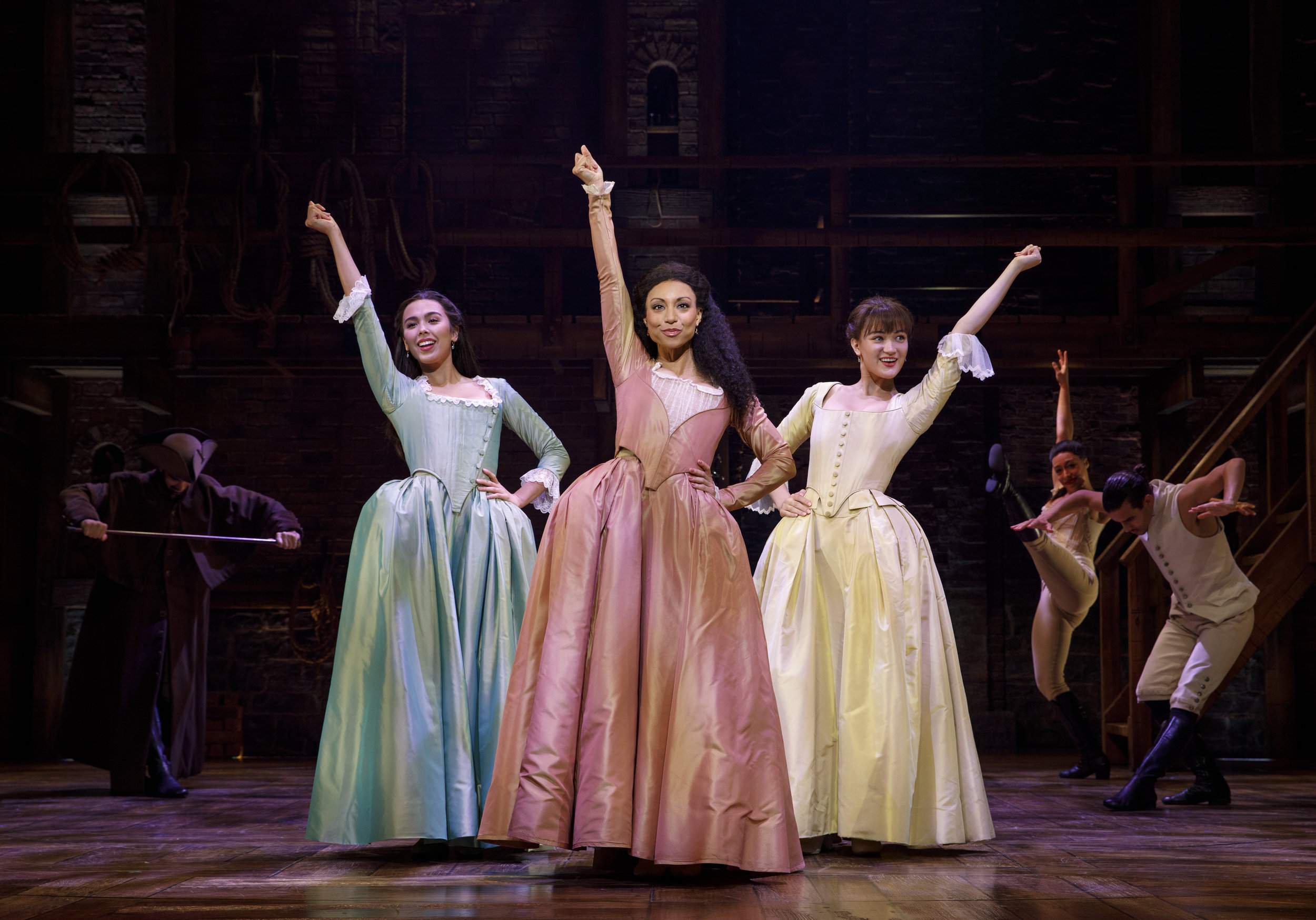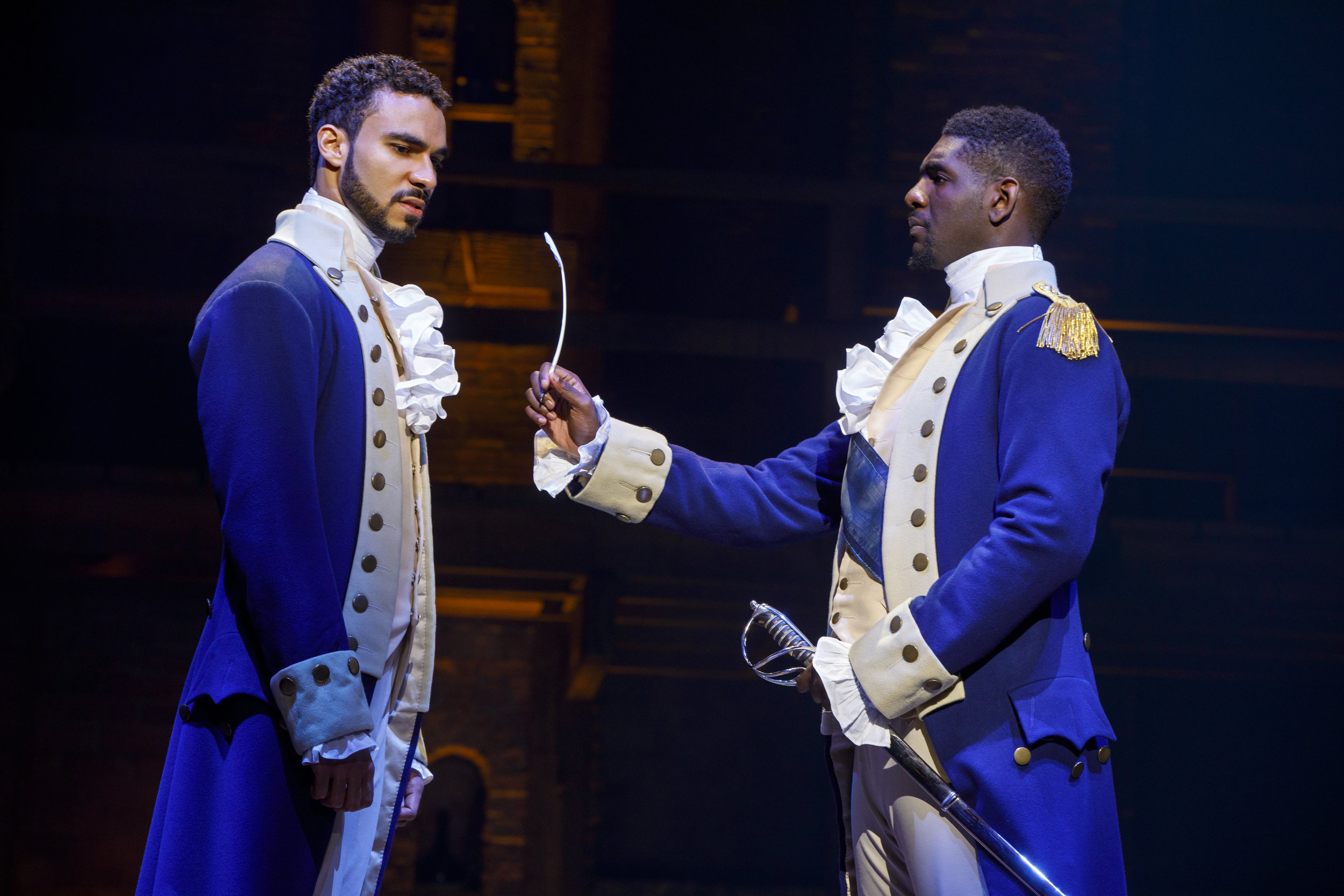Hamilton is a great show, seamless non-stop entertainment for two and a half hours. I saw it recently, and during intermission as I marveled at the impact it was having on me, I could not help comparing Hamilton with opera. Further while waiting, I checked Facebook thinking I might post a remark about the performance and saw one from Washington Post opera critic Anne Midgette. In a profound and provocative article, she states that Hamilton is opera; several commenters agreed it was opera. Up to that point, I had not considered Hamilton to be opera and doubt few of my fellow audience members, if any, were thinking they were seeing a great opera. So, why did she call this musical an opera, at least “in all the ways that count”?
Laurens (Reuben J. Carbajal), Hamilton (Austin Scott), Lafayette (Bryson Bruce), Mulligan (Chaundre Hall-Bromfield) and Company - HAMILTON National Tour. Photo by Joan Marcus; courtesy of the Kennedy Center.
The most common definition of opera is a play in which all the words are sung. And opera is the plural of the latin word for work, opus; opera is supposed to be the works, including music, singing, dancing, costumes, a storyline, and acting. Hamilton certainly has the works and all the words are sung with pretty voices maneuvered to fit the style and situation. As part of her argument, Ms. Midgette makes a case that being familiar with the album before seeing Hamilton improves the experience of seeing the show, though it is by no means equivalent to seeing the show; she says that is typical of operas, not Broadway shows. Maybe, but I found seeing Hamilton as the works before knowing much about it to be thrilling and satisfying in a way it would have lacked if I had listened to the album first. Critic for the NY Times Anthony Tommasini has made an argument that opera and musicals are different because in musicals the words are more important and in opera the music is more important. There is merit to that argument, though it is a matter of contention which is more important in opera, and if I think of West Side Story, I’m not so sure about musicals either. And the music in Hamilton is a major factor in its success as well. The critical element we associate with operas that Hamilton lacks is singing in an operatic style without a microphone, supported by music in the classical genre. Thus, it is correct to call Hamilton an opera, but doing so is like calling Russia a republic; technically, that’s correct, but…
Eliza (Julia K. Harriman), Anjelica (Sabrina Sloan), Peggy Schuyler (Isa Briones), and Company; Hamilton (Austin Scott) and George Washington (Carvens Lissaint) - HAMILTON National Tour. Photos by Joan Marcus; courtesy of the Kennedy Center.
The definition of opera and whether it fits Hamilton is not the main point of her perspective in the Post. Consider her poignant lamentation: “The irony is that what “Hamilton” represents now is exactly what opera used to be: a thrilling, contemporary, immersive stage presentation that’s a union of story, text, music, image and movement, and that gets under the skin and into the blood of a wide audience that feels it speaks profoundly to them.” She then charges: ““Opera” has become, in the popular imagination, a signifier of snooty elitism and artistic exaggeration, not to say stereotype (the fat lady in the Viking Helmet). But the only real difference between “opera” and “Hamilton” is that “opera” has become handicapped by what it is thought to signify — by the idea that it is thought to represent some sort of pinnacle of high art” and after admitting some operas are high art and broadway shows have certain production advantages, finishes with “If I had to list one distinction between “Hamilton” and opera, as a genre, I’d say that “Hamilton” is art, and opera, these days, merely symbolizes it.” This is a professional critic doing her job, a knight of the opera table. My take away is that what she wanted to discuss was not so much whether Hamilton was opera or not, but how opera has gone astray. Hamilton represents what opera was and still should be, a work connected as much to its current audience as to its art. That is an important and controversial thesis that should not be tossed off as simply whether Hamilton is opera or not.
Thomas Jefferson (Bryson Bruce) and Company - HAMILTON National Tour. Photo by Joan Marcus; courtesy of the Kennedy Center.
Let’s consider a bit further how opera compares to Hamilton, keeping in mind that this is rather unfair since Hamilton is one of the very best of its kind. First, opera companies must deal with audiences closely wed to the traditional repertoire; the box office bottom line works against new opera. Not so for Broadway musicals, which not only have the freedom to be new and different; but are expected to be. Thus a musical can connect with its audience by incorporating a popular current music genre, like rap, and nods to current issues such as a line uttered about immigrants. I suspect it also bridges cultural divides by using rap to tell American history. Hamilton has a feel-good story about the spirit of America going for it, and it presents our founding fathers as humans with opera-style grand passions, but importantly for its connection to a contemporary audience and to its fit as a musical and not an opera, it is the story and not the passions that are the focus, a story that connects readily with its American audience. Opera companies go to considerable lengths to explain how one to three hundred-year-old operas and their focus on great passions are still relevant today and spend money on updating productions, moving them forward in time, which to my mind are most often plastering over the originals and serve up conflicts, such as characters in modern times worrying about Neptune’s next move. Yes, the underlying elements of love, betrayal, ambition, and revenge of old operas are still important and relevant, but audiences now are distanced from attachments to Greek gods and royalty and the mores of past generations. And as Ms. Midgette points out, abstract, arty presentations can add to the gap. I think the grand passions are fine, but opera needs to tell stories that grip today's audiences. Opera must loosen its bonds to the past and engage more directly with life today if it wishes to be modern and vibrant, and not like Shakespeare’s repetoire, relegated to a small, loyal following.
Company - HAMILTON National Tour. Photo by Joan Marcus; courtesy of the Kennedy Center.
Unfortunately, new opera has not produced a Hamilton or Les Miserables as yet, nor even a modern Marriage of Figaro. Therein lies the conundrum: to generate a Hamilton, large-size resources are needed, but until a Hamilton is generated, opera companies are not going to provide new opera that level of resources. What new opera needs more than Hamilton to show the way is investors who make the way possible. The question that makes me uneasy is wondering whether a musical with opera-style singing can ever be a Hamilton? Is there too much distance now between the ears of the average music lover and that style? And how effectively can modern stories that require the breakneck pace of Hamilton be staged with an operatic singing style that requires we pause the action while the soprano finishes her heart-felt aria or the tenor takes ten minutes bleeding out to die? I don’t know, but some companies are experimenting, mostly small companies, but check out Opera Philadelphia’s Festival O18 for an example of progressive vision. Even Washington National Opera had a brief run at contemporary relevance with a creative, immersive Ring Cycle and showing two, not one, newer operas in the same season.
I say all this as an advocate for both new opera and old opera, who wishes to raise Caesar, not bury him…well, maybe a little…certain parts of his prefrontal cortex. But let’s also talk about what opera has that Hamilton does not, and I will contend that the depth of emotion and beauty of operatic-singing style’s is not as readily achieved with pop or rap music which I also really enjoy. I note that I went to see Hamilton without knowing any of the singers. Singers who are famous for singing opera superbly are part of opera’s appeal. Musicals don’t rely on the fame and reputation of the singers as much as opera does. I will also contend, though less strongly, that opera singing has more staying power than Hamilton will, perhaps because it focuses on the emotion more than the story. I enjoy the Hamilton songs, but I love the arias of Mozart and Verdi (maybe emotion over story?). I did the opposite of Ms. Midgette’s advice – I did not listen to the album before going, but I have listened to it a couple of times now. Frankly, for me the album is a bit of a letdown. Yes, it is very good pop music, great for a musical; every tune is likeable, but the music alone is no match for seeing the musical. It tells the story without the visuals and I don’t know how you can listen to “You’ll Be Back” and not wish you were in the theater listening to King George sing it. That disappointment rarely happens with opera. Admittedly, I don’t like Anna Netrebko’s recording from her "Russian" album (shone below from YouTube in video format) of the aria in the letter scene from Eugne Onegin as much as hearing it in a performance, but it’s not a disappointment to listen, even though I was very excited to see the performance in person. I think the other elements of musicals enhance the music whereas in opera, the music enhances the other elements. Nothing touches the heart as deeply and pervasively as the beauty of the human voice singing opera.
Anna Netrebko singing the letter scene's "Puskai pogibnu ya, no prezde" from the Metropolitan Opera's Eugene Onegin (Youtube).
So, where is the opera today that connects so strongly with its audience and that provides such good singing, including operatic-style singing and music that it provides the total immersion and ecstasy of a Hamilton or a Les Mis? I don’t know, but I keep going, hoping that one comes along that I don’t just like and enjoy, but that blows my socks off. Until then, we have Hamilton.





